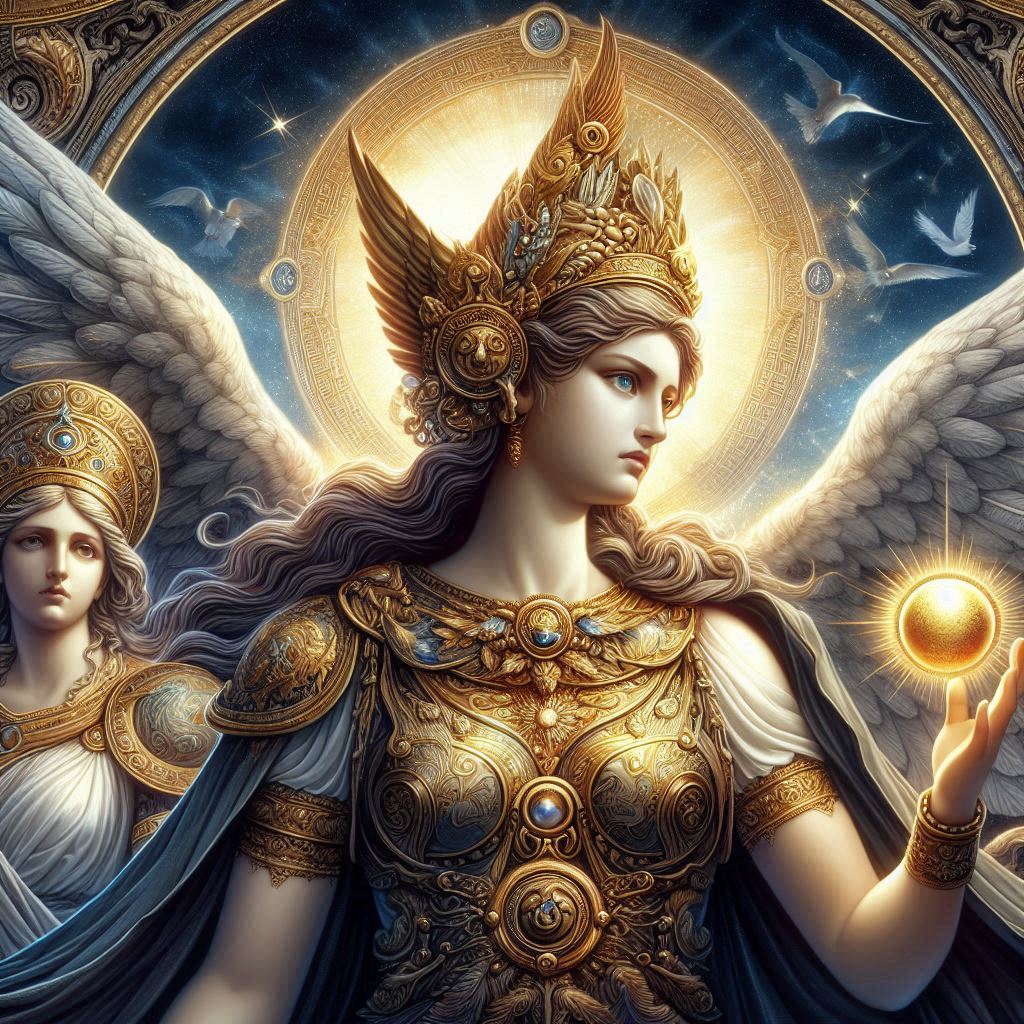Hera, the Queen of the Gods in Greek mythology, occupies a prominent and complex role within the pantheon of Olympian deities. As the wife and sister of Zeus, the king of the gods, Hera is revered as the goddess of marriage, family, and childbirth, as well as the protector of women and the sanctity of marriage vows. However, Hera’s character is also marked by her jealousy, vindictiveness, and fierce opposition to Zeus’s infidelities, which often lead her to clash with both mortals and immortals alike. Through her myths and legends, Hera emerges as a multifaceted and powerful figure whose influence extends far beyond the realm of Olympus.
Hera’s origins can be traced back to the earliest periods of Greek mythology, where she was worshipped as a goddess of fertility and motherhood. In ancient times, Hera was associated with the earth and the cycles of nature, revered as a patroness of women in childbirth and protector of the family unit. Her cults and temples were widespread throughout Greece, with prominent sanctuaries dedicated to her in cities such as Argos, Samos, and Olympia.
In Greek mythology, Hera is typically depicted as a regal and majestic figure, often portrayed wearing a diadem or crown and holding a scepter or lotus-tipped staff. She is commonly depicted with a solemn and dignified demeanor, reflecting her status as the queen of the gods and the embodiment of divine authority and sovereignty.
One of Hera’s defining attributes is her association with marriage and the family. As the goddess of marriage, Hera presides over the sacred bond between husband and wife, overseeing weddings, fertility rites, and domestic affairs. She is invoked by brides and grooms seeking blessings for their union and protection for their future offspring. Hera’s role as a matrimonial deity underscores the importance of marriage and familial bonds in Greek society, as well as the sanctity of oaths and vows sworn in her name.
Despite her role as the guardian of marriage, Hera’s own relationship with Zeus is fraught with conflict and turmoil. According to myth, Zeus pursued Hera relentlessly, captivated by her beauty and regal bearing. In an attempt to win her favor, Zeus transformed himself into various forms, including a cuckoo, a bull, and even a shower of gold, to seduce her. Despite her initial resistance, Hera eventually relented and became Zeus’s wife and queen of Olympus.
However, Hera’s marriage to Zeus is marred by his infidelities and numerous dalliances with mortal women and nymphs. Hera’s jealousy and fury at Zeus’s indiscretions are a recurring theme in Greek mythology, leading her to unleash her wrath upon Zeus’s paramours and their illegitimate children. Hera’s vengeful nature and relentless pursuit of justice against Zeus’s lovers and offspring serve as a cautionary tale about the consequences of betraying marital vows and defying divine authority.
One of the most famous myths involving Hera’s jealousy is the story of her rivalry with Zeus’s mortal lover, Alcmene, and her son Heracles (Hercules). When Zeus fathers Heracles with Alcmene, Hera vows to destroy the child out of spite and envy. She sends two serpents to kill the infant Heracles in his cradle, but the mighty hero strangles the serpents with his bare hands, demonstrating his divine strength and resilience. Hera’s failed attempt to thwart Heracles’s destiny sets the stage for their ongoing enmity throughout his legendary exploits.
Hera’s wrath is also directed at other mortal women who catch Zeus’s eye, such as Io, Europa, and Leto, who bear children by Zeus and incur Hera’s jealousy and vengeance. In each case, Hera subjects the unfortunate women to cruel and torturous fates, transforming them into animals, driving them into exile, or persecuting them relentlessly until they are rescued or avenged by divine intervention.
Despite her vengeful tendencies, Hera is also depicted as a compassionate and nurturing goddess, particularly in her role as a protector of women and children. She watches over expectant mothers in childbirth, granting them strength and endurance during labor and ensuring the well-being of their newborns. Hera’s maternal aspect is evident in her epithets such as “the nurse” and “the cow-eyed,” which highlight her caring and nurturing qualities.
Hera’s association with motherhood is further exemplified in her role as the mother of Ares, the god of war, and Hephaestus, the god of fire and craftsmanship. Although her relationship with Zeus is tumultuous, Hera’s devotion to her children is unwavering, and she fiercely defends their interests and honors their achievements. Hephaestus, in particular, holds a special place in Hera’s heart, as she nurtures and protects him despite his physical deformity and rejection by Zeus.
In addition to her domestic and maternal roles, Hera is also revered as a powerful and formidable goddess in her own right, capable of wielding great authority and influence over the affairs of both mortals and immortals. As the queen of the gods, Hera participates in the divine council on Mount Olympus, where she weighs in on matters of justice, morality, and cosmic order. Her presence commands respect and deference from the other Olympian deities, as she embodies the ideals of sovereignty, wisdom, and divine authority.
Hera’s sovereignty extends to her control over the forces of nature, particularly the weather and the seasons. As a sky goddess, Hera is associated with the heavens and the celestial realm, where she oversees the cycles of day and night, the movement of the stars, and the passage of the seasons. Hera’s influence on the natural world is evident in her epithets such as “the cow-eyed” and “the ox-eyed,” which evoke her connection to the earth and the cycles of fertility and abundance.
Despite her formidable powers and regal bearing, Hera is not immune to the vulnerabilities and frailties of the human condition. Hera’s struggles and conflicts in Greek mythology are emblematic of the complex dynamics within the Olympian pantheon and the broader themes of divine rivalry, power struggles, and the consequences of unchecked ambition and pride. While Hera’s role as the queen of the gods grants her immense authority and prestige, it also exposes her to challenges and conflicts that test her resilience, wisdom, and capacity for compassion.
One of Hera’s enduring conflicts is her ongoing rivalry with Zeus, her husband and king of the gods. Zeus’s infidelities and dalliances with mortal women and nymphs provoke Hera’s jealousy and wrath, leading to numerous confrontations and clashes within the divine hierarchy. Hera’s relentless pursuit of justice and retribution against Zeus’s lovers and illegitimate offspring fuels her reputation as a vengeful and formidable goddess who does not tolerate betrayal or defiance.
One of the most famous episodes involving Hera’s rivalry with Zeus is the story of the Trojan War, where Hera aligns herself with the Greeks in their conflict against the city of Troy. Hera’s animosity towards Troy stems from Zeus’s favoritism towards the Trojan prince Paris, who awarded Aphrodite the golden apple of discord in a beauty contest, choosing her over Hera and Athena. Hera’s desire for vengeance and retribution against Troy drives her to intervene in mortal affairs, manipulating events and alliances to ensure Troy’s downfall.
Hera’s involvement in the Trojan War reflects her strategic cunning and willingness to use her powers to achieve her goals, even if it means defying Zeus and risking divine discord. Her schemes and interventions, such as inciting the Greek hero Diomedes to attack the gods on the battlefield or deceiving Zeus to distract him from aiding the Trojans, demonstrate her resourcefulness and determination to influence the outcome of mortal conflicts.
Despite her rivalry with Zeus and her reputation for jealousy and vindictiveness, Hera also exhibits moments of compassion, forgiveness, and benevolence in Greek mythology. Her role as a protector of women and children is evident in her interactions with mortal heroines such as Alcmene and Leto, whom she persecutes out of jealousy but ultimately grants mercy and assistance when their plight becomes dire.
Hera’s compassion is also seen in her interactions with mortals who show her respect and reverence, such as the Argonauts, whose leader Jason earns Hera’s favor through his piety and devotion. Hera aids the Argonauts on their quest for the Golden Fleece, offering guidance, protection, and divine assistance to ensure their success. Her alliance with mortals who honor her and uphold her values reflects her capacity for generosity and loyalty beyond her divine conflicts.
Another aspect of Hera’s character is her association with the sanctity of marriage and the family unit. As the goddess of marriage, Hera is invoked by brides and grooms seeking blessings for their unions and protection for their households. Despite her own tumultuous marriage with Zeus, Hera embodies the ideals of fidelity, commitment, and partnership in Greek society, emphasizing the importance of marital vows and domestic harmony.
Hera’s role as a maternal figure is also significant, particularly in her relationship with her children Ares and Hephaestus. Despite the challenges and conflicts she faces as a mother, Hera demonstrates unconditional love, devotion, and protection towards her children, nurturing their talents and abilities and defending their interests within the divine realm.
Hera’s interactions with other Olympian deities and mythical figures further illuminate her character and influence within the Greek pantheon. Her alliances and rivalries with gods such as Athena, Artemis, and Aphrodite highlight the complex dynamics of power, authority, and alliances among the Olympian gods and goddesses.
Hera’s enduring presence in Greek mythology as the queen of the gods and goddess of marriage, family, and childbirth underscores her importance as a symbol of divine authority, maternal protection, and the complexities of human emotions and relationships. While her vengeful nature and conflicts with Zeus are central aspects of her mythological portrayal, Hera’s multifaceted character also encompasses qualities of compassion, wisdom, and devotion that add depth and nuance to her role within the Olympian pantheon.









